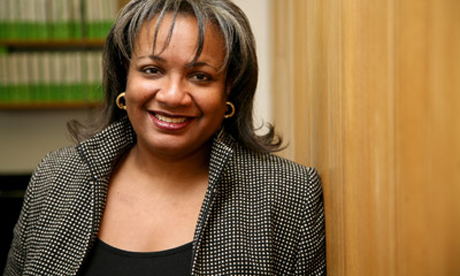Hackney politicians clash over ‘bedroom tax’

Diane Abbott, MP for Hackney North & Stoke Newington
The Labour party needs to be “the voice of the people who do not have a voice” according to Diane Abbott, MP for Hackney North and Stoke Newington.
Speaking at a public meeting held in Abney Hall earlier this month, Ms Abbott discussed the impact of the government’s proposed changes to the welfare system – including the controversial ‘bedroom tax’ – and how Hackney residents would be affected.
Under the tax, which comes into force from April 2013, social housing tenants in receipt of housing benefit would see the allowance cut by 14 per cent if their home has one ‘spare’ bedroom; or if they have two or more, by 25 per cent.
Figures released by the National Housing Federation (NHF), a trade body representing social housing providers in the UK, estimate as many as 4,579 people in Hackney could be affected by the reforms.
The NHF claim those in the borough with one bedroom deemed surplus to their needs would pay an additional £767 a year, whilst those with two or more would face a shortfall of £1,370.
Prior to the meeting, Ms Abbott, the Shadow Health Minister, had called the reform “brutal and deeply divisive, and yet another example of the punitive nature of the Coalition Government’s policies – hitting the poorest hardest.”
She added: “The coalition government claims those who will be hit by the housing penalty can downsize, use savings, or their income to meet the shortfall.
“However, re-housing is not an option for many as the current housing stock does not reflect the local housing need.”
Hackney Homes, which manages the council homes in the borough on behalf of Hackney Council, confirmed 2,160 of their tenants will be affected by the changes – including 553 who will have two or more ‘spare’ rooms and face a 25 per cent cut to their housing benefit.
A spokesperson for Hackney Homes said: “Communications is being carried out directly to those tenants affected by the benefits changes.”
“Communication with residents will continue,” they added.
Mayor of Hackney, Jules Pipe, said figures showing the number of housing benefit claimants falling in wealthier boroughs but increasing in outer areas demonstrated a “social cleansing” of inner London.
He said: “We are not talking about hundreds; we are talking about thousands [of people affected by the benefit reforms].”
Speaking at Prime Minister’s Questions (6 March) David Cameron said the reforms were “not a tax” but were in the “issue of fairness”.
“How can it be fair that people on housing benefit in private rented accommodation do not get a spare room subsidy but people in social housing do? That isn’t fair and we are putting that right,” said Mr Cameron.
The government plans were introduced to tackle housing waiting lists which have doubled in the past 15 years.
Conservative London Assembly Member Andrew Boff said: “Despite the last government recognising that the costs of the benefit system were spiralling out of control, from £11 billion to £21bn between 2000 and 2010, they did little to address it and left the decision to a later day. This is that later day.”
Mr Boff said a public opinion poll from 2011 – the British Social Attitudes Survey – revealed only 28 per cent of Britons thought more money should be spent on welfare benefits.
“Hard working families may wonder why Diane Abbott is so against public opinion.”
He added: “Families in Hackney will want to see their hard earned taxes going towards helping those in genuine need and to alleviate the chronic overcrowding in this borough, not to subsidise spare rooms in areas that they themselves cannot afford.”
According to figures obtained by the Hackney Citizen, 19,713 people were registered on the housing waiting list of Hackney Homes at the end of January 2013.
